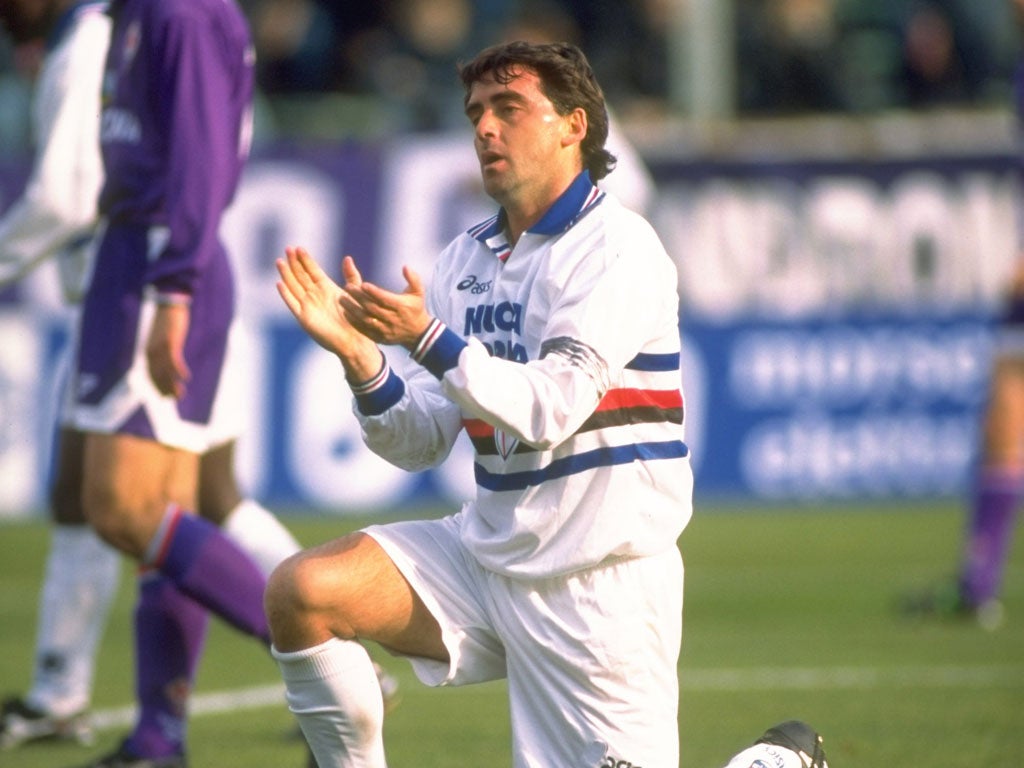Moody, petulant, indignant. How would City have dealt with a player like Mancini?

There is a sophisticated charm about Roberto Mancini; he is a man who looks as though he was born to wear expensive suits. When a player defies him, with his aura of class and authority, it feels wrong, against the natural order of things.
He gives such an air of calmness and rectitude that it seems almost incomprehensible that he was a player who found himself raged against authority, yet the truth is he was as rebellious as anybody in Serie A in the early Nineties, falling out with the Italy coach at successive World Cups, before a spectacular tantrum while playing for Sven Goran Eriksson at Sampdoria.
Other coaches have had their differences with Carlos Tevez, but perhaps the most revealing detail of this week's episode was Edin Dzeko's clear frustration when he was substituted. Taken alone, it probably would not be too significant – a player letting his displeasure be known as he leaves the pitch. But this was Dzeko, who has no previous record for stroppiness; a player, in fact, noted as being one of the nicest men in football. And this was Mancini, who seems to have taken the feistiness he showed as a player into management.
The most notorious and protracted of his strops came during the 1990 World Cup, and was directed against the coach Azeglio Vicini. Mancini had been captain of Vicini's Italy Under-21 side who, although beaten on penalties by Spain in the final of the 1986 European Under-21 Championships, are still regarded as the greatest youth side Italy has ever produced. There, he played alongside Gianluca Vialli, a partnership he reprised at Sampdoria.
To Mancini at least, he should have partnered him at the 1990 World Cup. Vicini's appointment as national coach was at least in part motivated by his supposedly good relationship with those young players, who were beginning to break into the senior side.
Mancini was one of six forwards Vicini selected in his 22-man squad – the result, many suspected, of Vicini's lack of ruthlessness when it came to making key decisions – but having started alongside Vialli at Euro 88, he seemed a likely starter, particularly when Vicini announced he would be "the surprise of the World Cup". "Yeah, the surprise was that I never got to play," Mancini moaned later. "I wasted 70 days of my life between the training camp and the World Cup and didn't get a single minute. 70 days! 70 days I'll never get back..."
At the time the conventional wisdom was that Mancini could not play in the same side as Roberto Baggio, who emerged as a world-class player at that tournament. "Nonsense!" Mancini said. "Anybody who understands football understands we could have easily played together."
The more likely explanation was politicking; priority was given to players, such as Napoli's Andrea Carnevale and Juventus's Toto Schillaci, who played for the giants of Italian football. "It was my fault," Mancini said. "My fault that I played for Samp. Just as it was Vialli's fault and Pietro Vierchowod's fault that they were also with Samp and not with a 'big club'. Let's face it, Vicini has never been a particularly brave man..." While he didn't actually refuse to play for Vicini, his general disruptiveness and the daily aggravation in training meant that Mancini effectively made it impossible for the coach to pick him.
And so Mancini never played a minute of a World Cup match. As a 17-year-old, he had been in Enzo Bearzot's provisional 40-man squad for the 1982 World Cup, but was left out of the final 22. He would surely have been included in the squad for 1986, but on a tour of the United States, he came back late after a night out in New York and found Bearzot waiting for him. "Perhaps I was wrong not to apologise," Mancini said, "but I had done nothing wrong. And Bearzot swore never to select me."
His hopes of going to the USA World Cup ended in March 1994, when he reacted furiously to being substituted at half-time of a friendly against Germany. Arrigo Sacchi refused to pick Mancini again. His international career ended that night, with 34 caps.
However, the worst incident perhaps came a year later in a game between Sampdoria and Internazionale. When the referee Marcello Nicchi turned down a penalty appeal, Mancini was furious and after he had been dragged away from the referee by his goalkeeper Gianluca Pagliuca, he stormed from the pitch, throwing down his captain's armband and insisting he wasn't going to play again.
After a long argument with Eriksson, his coach, he returned to the field, only to be sent off after a lunge at Paul Ince and more angry words with Nicchi. It earned him a six-week ban.
The world is full of reformed hotheads in positions of power – youthful indiscretions should not be used to deny a coach's authority – but you could be forgiven for wondering how Mancini the manager would have handled Mancini the player.
Join our commenting forum
Join thought-provoking conversations, follow other Independent readers and see their replies
Comments